ONE HUNDRED DAYS OF ACTIVISM IN THE CHILEAN COMMUNITIES ABROAD

October 18, 2019 was Chile’s transversal awakening, but not only there; it was also the awakening of Chilean communities living abroad in 150 cities, in more than 30 countries around the world.
January 31, 2020
By Betzabeth Marín Nanco
It seems that it was a couple of days ago when we were watching CNN Chile that exceptionally released its signal outside the country. There, President Sebastián Piñera declared a State of Emergency to counteract the increasingly justified and well-attended street demonstrations against the injustices that the neoliberal experiment had generated. In Piñera’s words, the mobilizations were led by “a powerful, implacable enemy who respects nothing and no one and is willing to use violence and crime without any limits” How can we forget these words? More than a hundred days have passed and they are becoming more and more absurd.
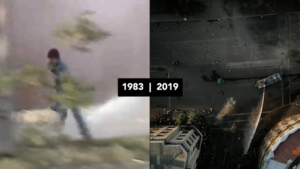
Image of the Documentary Chile in Flames
The idea of the powerful enemy was the Government’s initial justification for sending the Military into the streets along with the Carabineros. Those of us who live abroad saw the images of Pinochet’s dictatorship come to mind. We imagined the military and police repression and the terrible consequences this would have on our people. The impotence of being far away did not take long to arrive, in front of our eyes we saw the beatings, the wounds, the mutilations, the illegal detentions, the abuses against girls, boys, children…
That helplessness, and then fear, led us to organize ourselves, to coordinate ourselves from that very day in what we would later call: the international territory. In Barcelona and Copenhagen we immediately thought that if this situation escalated – to a dictatorship, why not say so – international coordination and solidarity would be fundamental.
We were quickly articulated, and in less than a week we were already seventy coordinated cities. The third weekend of October was full of calls to Chilean people living abroad, and what began as a network of informal contacts would end up becoming what today is the Chile Despertó International Network.
The third weekend of October was full of calls to Chilean people living abroad, and what began as a network of informal contacts would end up becoming what today is the Chile Despertó International Network.
The days passed and we realized that the militarization of the country would not stop the acts of civil disobedience and massive demonstrations. Far from decreasing, the people in Plaza Dignidad were increasing day by day. It was no longer just the usual social movements: students, feminist collectives, collectives for sexual diversity, Mapuche people, residents, workers of today and yesterday, rural men and women, environmentalists and so many others. Those people who until that moment no longer believed in collective power were also taking to the streets, much less that things could change because they had lost hope. Through the Internet, we saw with emotion and pride, the transversal social awakening, not because of the thirty peso increase in the subway fare, but because of the more than thirty years of abuses against our people.
Organization in cities abroad
“They took so much from us, we have nothing left to lose,” was one of the phrases we saw on banners, posters and social media. Day by day, slogans like these inspired us to go out to the streets of the cities where we lived; we wanted the world to know what was happening: we wrote in different languages “In Chile they are killing us”; we shouted “Sister, brother, don’t give up, we are fighting in the whole world”, as if we could be heard by those who were literally losing their lives in Valparaiso, Temuco, Antofagasta and so many other cities in our country.
And so, we began to meet more Chileans in the calls we made in Buenos Aires, New York, Paris, Madrid, Stockholm, Hong Kong, Melbourne… and many other cities. We quickly realized that if they were organizing in Chile, we in the international territory had to do the same if we wanted to support them and expose the military and police repression.
Little by little we would begin to gather in assemblies, town halls and groups a diversity of Chilean people: exiles, scientists, workers, indigenous people, professionals, artists, students; of different ages and origins, born in Chile or children of Chileans living abroad. Even the presence of people from the country where we live would begin to be common: Germans, Austrians, Canadians, New Zealanders, Mexicans, Brazilians, among others, would walk with us through the streets of the world. The militarization of the country had the effect – perhaps unwanted by the government of Piñera – that the international territory woke up, became cohesive and articulated to fight for two causes: the non-impunity of the violation of human rights in Chile since October 18, 2019, and the support to the demands of the popular movement.
The militarization of the country had the effect – perhaps unwanted by the government of Piñera – that the international territory woke up, became cohesive and articulated to fight for two causes: the non-impunity of the violation of human rights in Chile since October 18, 2019, and the support to the demands of the popular movement.
The number of cities mobilized rose to over 150 at the peak of police and military repression of the people’s rebellion. The demonstrations of support would be multiple: marches, vigils, screenings and rallies in strategic places such as consulates and embassies, or tourist locations such as Times Square (New York), Sagrada Familia Basilica (Barcelona), Brandenburg Gate (Berlin), Opera House (Sydney), London Bridge (London), Obelisk (Buenos Aires), Kyoto Station (Kyoto), Gwanghwamun Gate (Seoul) and Puerta del Sol (Madrid); cultural events such as artistic performances, film festivals, talks, concerts and peñas to raise money for first aid teams in Chile; and meetings with relevant international actors to denounce human rights violations in Chile. During the first month, at least 373 actions would be called to make visible abroad what was happening in Chilean territory.
After three months, looking back, it is impressive to see how intense and extensive our actions were. It seems that the anguish and fear of an imminent military dictatorship moved us more than ever. In fact, in some cities, along with organizing commissions to take action, handle communications, or promote political discussion, mental health teams were formed. There was talk that we were being affected by the Ulysses syndrome – stress from extreme situations in migrants. How many of us had problems sleeping, eating, working and bonding? Grief, anguish, guilt? Could it have been different?
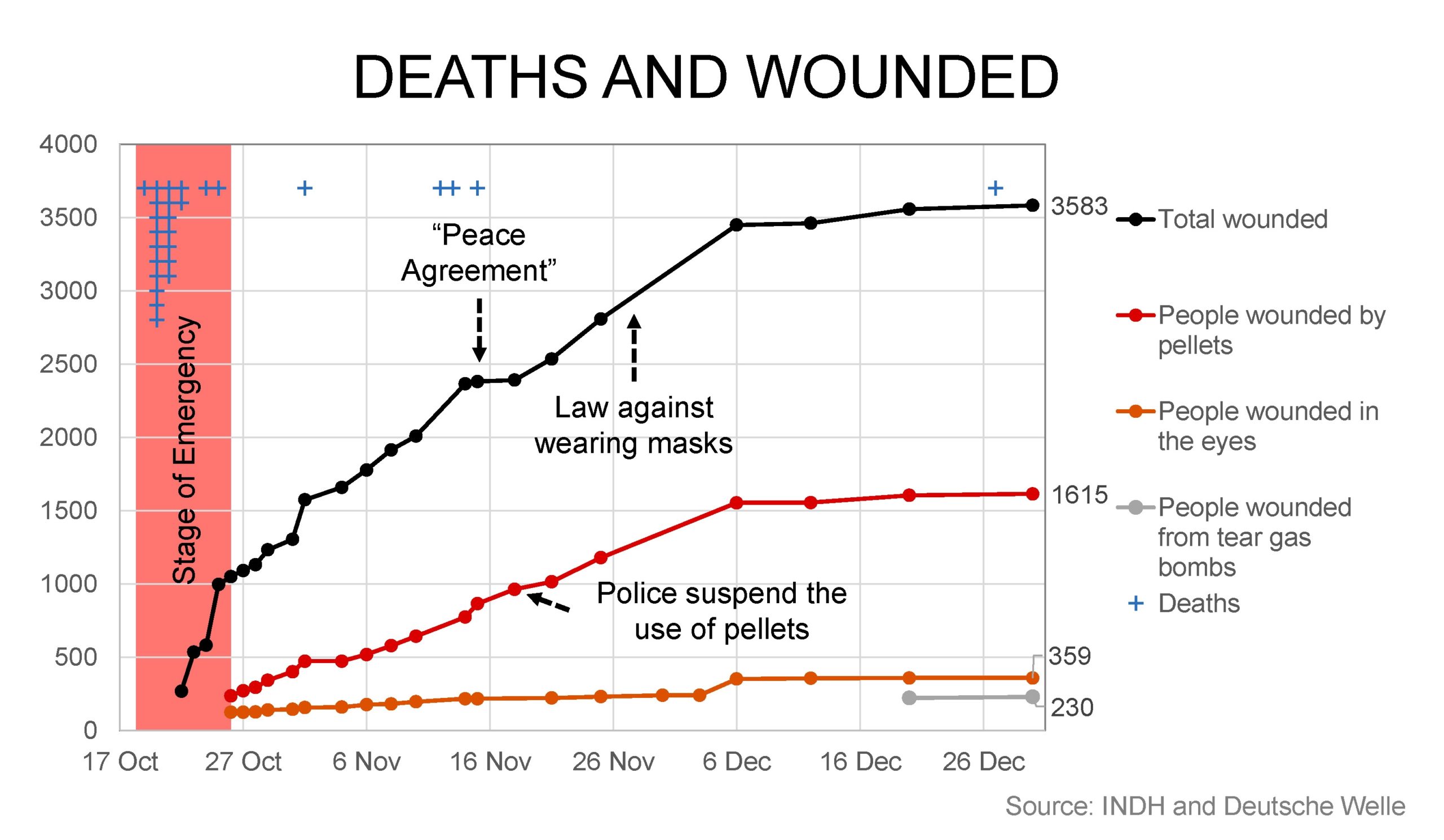
Source: Second Legal Report – Human Rights Committee 18.10 – ChDI (download link)
Despite the signing of the Peace Agreement and New Constitution – which as ChDI we opposed as it developed in a context of impunity – and the suspension of the use of bullets, we saw that the number of injured and mutilated people increased as the days went by. We looked at it in our social media and counter-information sources, and yes, we spent a good part of the day in front of our mobile phones because we had access to a lot of information, probably more than our peers in Chile. That was distressing. And so what was left for us? Getting together, organizing and mobilizing, not only in our own territory, but with the whole world.
Many people who today are part of the Chile Despertó International Network (ChDI) would suspend their personal and professional projects to dedicate themselves totally to international coordination until its consolidation, until they have what they have achieved today.
The coordination between cities: consolidating the Chile Despertó International Network
In its early days, ChDI would be a virtual space for support, information and dissemination of what we were doing in diverse cities. We would meet virtually up to three times a week, we would keep a record of the events and we would publish them through social media so that every person who lived in this or that city abroad would join the actions in support of the popular movement in Chile.
The simple way of organizing would change when a delegation from the European Parliament contacts ChDI to organize their visit to Chile in late October 2019. Members of the European Parliament Miguel Urban Crespo and Idoia Rodriguez Ruiz, from the European United Left/Nordic Green Left parliamentary group, would travel to our country as human rights observers and we would make sure that they knew first-hand what was going on. This was how ChDI’s first working committee would be formed: the Human Rights Committee. Our job would be to get them to meet with social, union, territorial and human rights organizations. Although we had less than a week to organize everything and write the documents for the visit, everything would be a success. To this day we are still benefiting from this increasingly close link with the European Parliament.
The creation of the Human Rights Committee would lead us to make our organization more complex. In November, the Internacional Coordination Board (MAI, for Mesa de Articulación Internacional) would be born, a space where the local assemblies, cabildos and ChDI groups would meet weekly, and the Popular Agenda (AP, for Agenda Popular) committee, which would initially arise from the call to hold Cabildos at the international territory. The participating cities would distribute in the committees, but we would converge at the Board every week. Along with this, we would have new digital spaces to communicate such as the ChDI International Forum and the Telegram Information Channel.

Spain, Barcelona
This separation of work, and its subsequent articulation through the MAI, would allow us to join actions announced from Chile. Early on October 25, we would join the call for the Largest March in Chile; and then, the call to hold town hall meetings (“cabildos”) in the neighborhoods. In November, we would adhere to the General Strike of November 12; we would approve our first coordinated action in rejection of the Peace and New Constitution Agreement, signed in a context of total impunity for human rights violations, accompanied by a statement read in various parts of the world; and we would conclude the month with the reproduction in multiple places around the world of LasTesis, which reignited the engines of the feminist movement since November 25 throughout the world. In December, we would hold citizen consultations similar to those convened by Chilean municipalities to find out the position of our assemblies on whether or not they support: the change of Constitution, a Constituent Assembly, parity, the inclusion of indigenous peoples, and having an international district. In January 2020, we would join the “Week of agitation for the prisoners of the revolt in Chile,” convened from the 13th to the 19th of that month.
In addition to joining the actions called from Chile, we would develop exclusive calls for the international territory. One of them would be to attend the COP25 and the World March for Climate on December 6, 2019. There we would have a moment of intervention on the main stage, but we would also make sure that the media waiting for Greta Thunberg would know what was happening in our country, interrupting the live broadcast, with a big canvas that said “the neoliberal model was born and dies in Chile”. We also did so with an interview that former Chilean President Michelle Bachellet was giving in Madrid. Finally, how could we forget the intercity assembly that we managed to hold there, where some people who had been hearing our voices for more than eight weeks were seeing our faces for the first time.
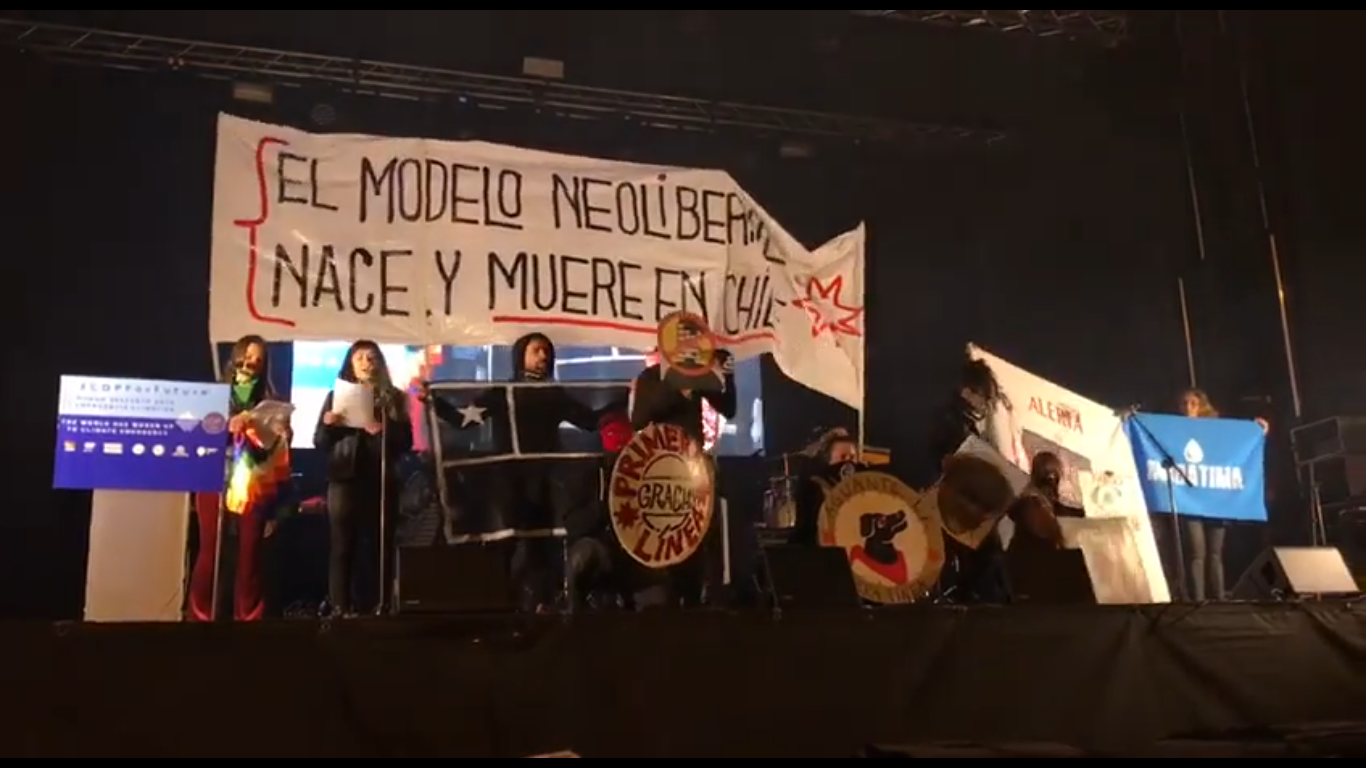
Spain, Madrid | Stage of the Peoples‘ Global Summit
Another of the actions developed by the cities of the international territory would be that of the World Day of Human Rights, which we would call “24 hours of live transmission for Chile”. This coordination was difficult, but we managed to broadcast for a whole day, considering the time differences, from Australia to Canada.
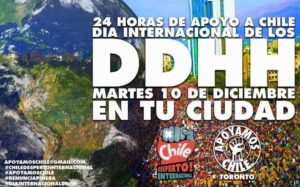
Poster of International 24-hour campaign to support Chile
Other campaigns are still underway. Among them, the boycotts to national products linked to national and multinational extractive companies; the discourse of the urgency to review the international cooperation agreements of Europe and other places of the world with Chile, especially the support to the Chilean police and the application of the democratic clause of the commercial agreements; and the campaign to make visible and denounce the violations to the Human Rights in all the public instances, weaving networks with local actors like political organizations, governments, NGO’s, press, unions, social movements, academia and communities of the neighborhoods where we live.
In order to finish consolidating our structure, in the last month and a half, two new committees have emerged in ChDI: Solidarity and Liaison with Chile Committee and Editorial. Both are an expression of the expansion of the tasks we are having as a network, and the more ambitious objectives we are setting ourselves. The fact is that the awakening of Chileans abroad is not only being sustained by the incessant support for social and popular movements in the country. Today we have found our own motivations.
…the awakening of Chileans abroad is not only being sustained by the incessant support for social and popular movements in the country. Today we have found our own motivations.
After the demilitarization of the Chilean territory, the local instances are beginning to have space to deepen our own demands as nationals living abroad. Especially important will be the demand to have representation in the Constituent Assembly and the creation of districts in the Chilean Parliament that consider those who live abroad; likewise, the cities will begin mobilizations in the consulates and embassies for the reduced number of physical instances where to vote for the April Plebiscite, appealing to the fact that due to physical distances or lack of money we could not exercise our right to vote that we won a couple of years ago.
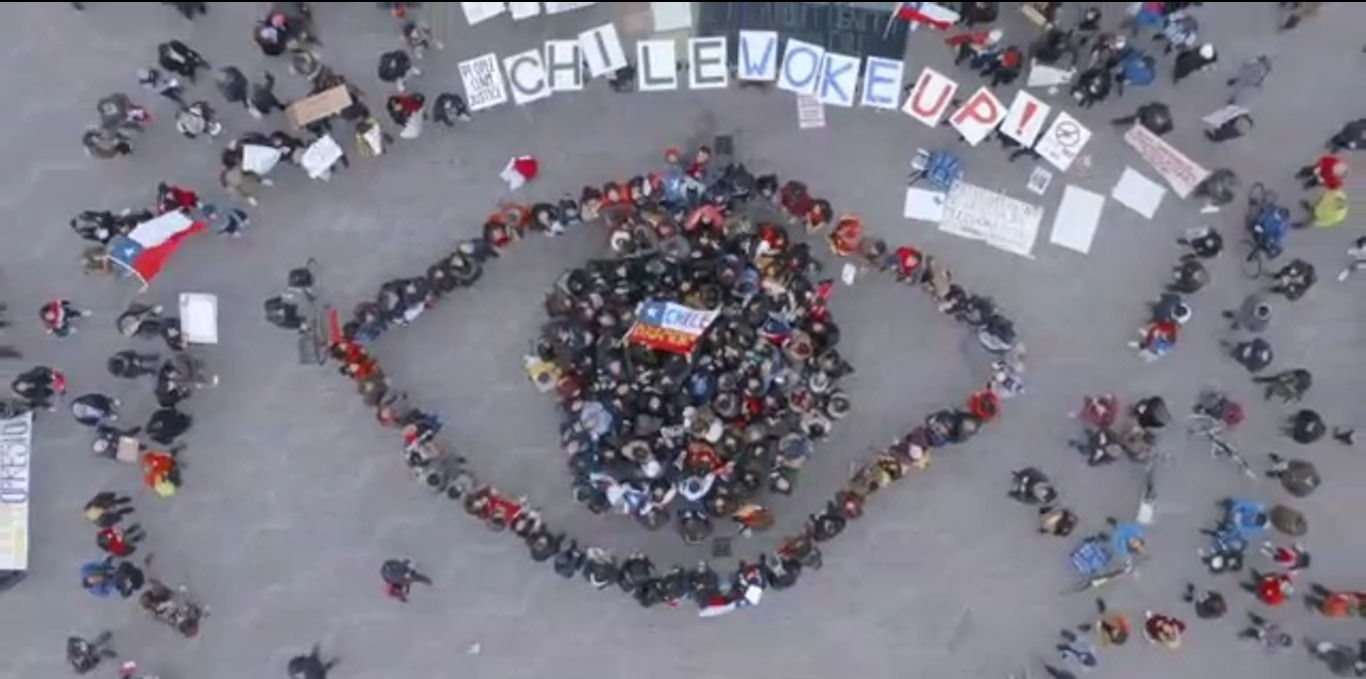
Denmark, Copenhagen
And after a hundred days of activism abroad, what is next?
In fact, we have already been active for 106 days for Chile and although the intensity has decreased, today we know that we have the capacity, the speed and the will to organize ourselves in the face of any event that risks the well-being of our people and democracy in our country. This should at least be a factor to consider for those who are thinking of installing an authoritarian regime in Chilean territory again. ChDI and the territorial assemblies of the international territory represent the way in which many people end up channelling their anguish, grief and anger. We turn all this into solidarity, a fraternal, sororous and emotional support, and territorial and international organization in order to achieve our objectives.
ChDI and the territorial assemblies of the international territory represent the way in which many people end up channelling their anguish, grief and anger. We turn all this into solidarity, a fraternal, sororous and emotional support, and territorial and international organization in order to achieve our objectives.
The participating groups have been organized in assemblies, councils and groups. The majority have an assembly way of functioning, that is, our actions are based on collective decision making, we have a horizontal structure and we are self-convened, self-managed and self-organized. Within this, it should be noted that there are different levels of membership of ChDI, which respects the autonomies of local authorities and their forms, levels and complexities of organization. With this, we have tried to move towards more democratic and sororizing ways of relating, inspired by the principles of social movements in Chile.
After three months, ChDI has strengthened. From being a network of local assemblies representatives that we converged to comment on what we were doing in our territories, today we articulate ourselves because we project short, medium and long term objectives. The reflection that we are not outside the movement, but that we are part of it, is something increasingly common among Chilean people abroad. Every day there are more cities that ask about our work and seek to unite after understanding the project we have co-built among the participants. Thus, the popular uprising of October 2019 is becoming the opportunity to also ask about our position as migrants and the role that the Chilean State has or could have in that, those of us who live outside our country feel that it should protect and guarantee us with some minimum rights such as the right to vote.
